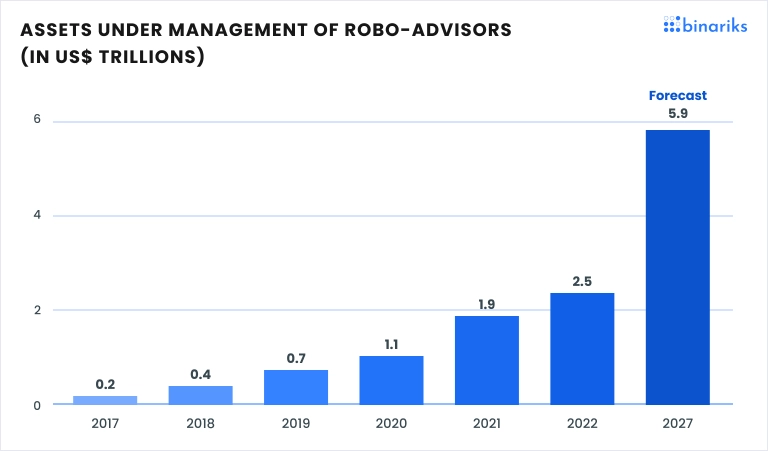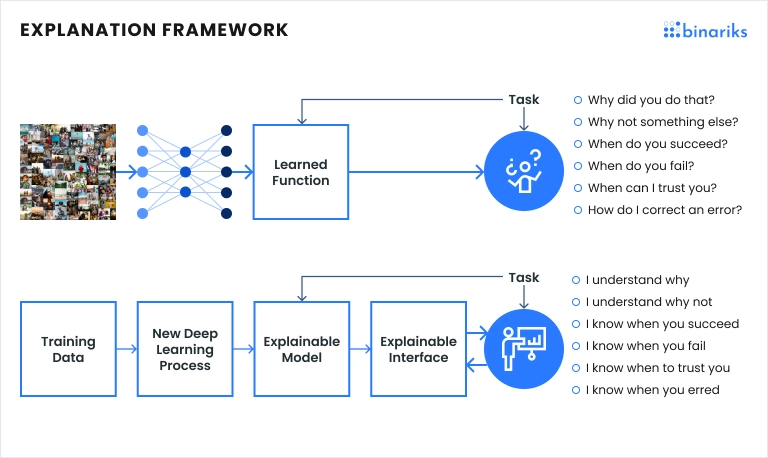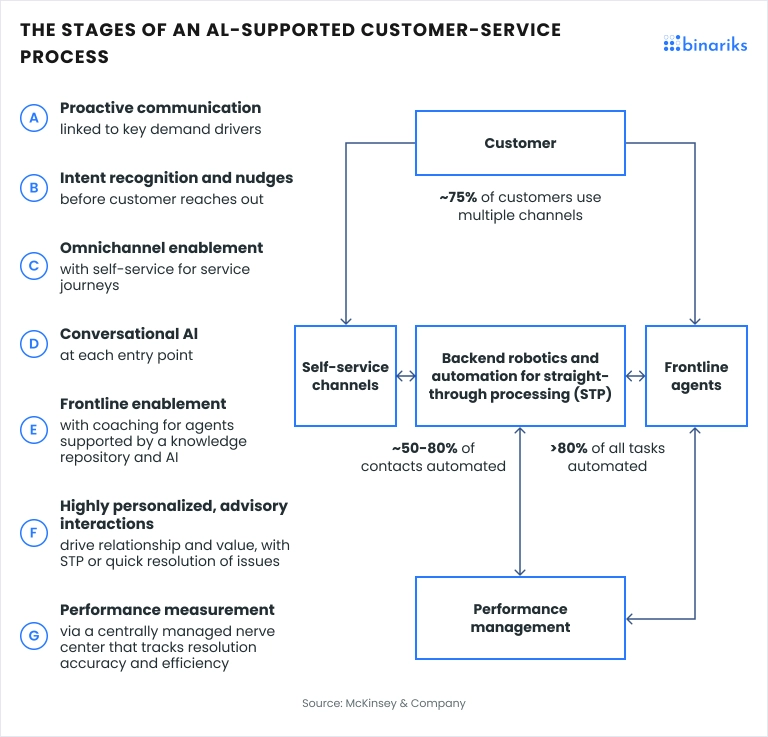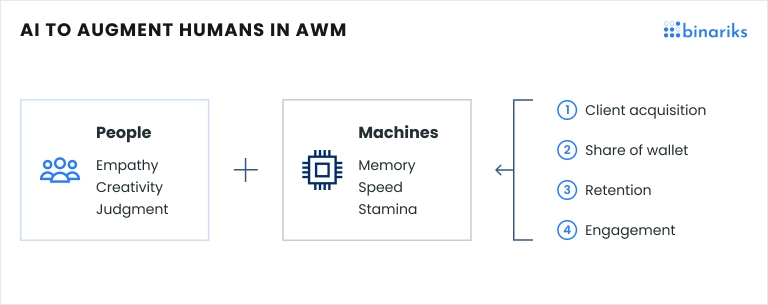The mahogany gleam of old-school wealth management has faded, replaced by the soft hum of silicon. AI, once a sci-fi whisper, is now the alpha on Wall Street, reshaping portfolios and crafting bespoke strategies in lines of code.
We at Binariks know this revolution firsthand. We've seen the power of AI to predict market moves with uncanny accuracy and craft personalized investment plans that dance with market volatility. So, buckle up as we unpack the benefits of AI wealth management and biases of AI in wealth management. We'll explore real-world use cases , from robo-advisors outperforming human intuitions to AI-powered risk management that weathers financial storms.
Here's a sneak peek of what's to come:
- The benefits: Personalized investing, optimized portfolios, and client engagement on steroids – but is it all sunshine and rainbows?
- The use cases: From robo-advisors exceeding human performance to AI-powered portfolio optimization that dances around market volatility – let's see these algorithms in action.
- The future: Will AI be our financial savior or usher in a robo-advisor apocalypse? We'll explore the possibilities, both utopian and dystopian.
Join us as we crack the code on AI and wealth management. Let's peek behind the curtain and see the future of finance, one byte at a time.
Trends and benefits of AI in wealth management
Wealth management AI has transformed from futuristic buzz to tangible benefits, reshaping the landscape for both clients and advisors. Now, we have chatbots, robo-advisors, AI-powered portfolios, financial forecasting, risk management, etc. Let's get into the details and benefits.
Hyper-personalized investment strategies
No more one-size-fits-all portfolios. AI algorithms crunch mountains of data – risk tolerance, financial goals, life stages – to craft perfect investment plans that truly suit each client's unique needs. According to Delloite analytics, personalized product design, tailored advice and recommendations, pricing optimization, and tactical communications and servicing strategies contribute to future-proofing the institution while integrating customer centricity (Source ).
Robo-advisors on steroids
Gone are the days of wealth management being reserved for the elite. AI-powered robo-advisors offer low-cost, accessible investment solutions, bringing wisdom to Main Street. A report by Statista predicts the global robo-advisor market will reach 34 million users in 2027, highlighting the surging demand for democratized wealth management (Source ).

Explainable and transparent AI algorithms
Forget black boxes and blind trust. AI algorithms allow clients to understand the rationale behind recommendations and build trust with their AI advisors. This transparency is essential for wealth management AI solutions' responsible and ethical use.

Imagine your AI advisor not just telling you what to do but why. Explainable AI (XAI) technologies lift the veil on algorithmic decision-making, allowing clients to understand the factors influencing their portfolio adjustments or risk assessments. According to IBM: "The difference between AI and XAI is that XAI implements specific techniques and methods to ensure that each decision made during the ML process can be traced and explained (Source )."
Client engagement on fast forward
From passive clients to active participants. Using AI in wealth management, like chatbots that can help you answer questions 24/7, personalize financial content , and trigger proactive alerts, fostering deeper client engagement and building trust.
Findings from Stanford University and MIT researchers highlight positive outcomes of implementing an AI-powered conversational assistant for 5,200 customer support agents across multiple countries. The tool not only boosted agent productivity by 14% but also led to higher average NPS scores and a 9% decrease in monthly agent attrition (Source ).

Perfectly tailored financial content
AI can become your financial concierge, curating content tailored to your needs, goals, and risk tolerance. Imagine bite-sized financial wisdom delivered right to your fingertips, like a personalized financial newsfeed.
AI can analyze your financial profile and interests to recommend articles, videos, and podcasts that resonate with you, keeping you informed and engaged. It also can translate financial concepts into actionable steps, suggesting investment strategies, budgeting tips, or even debt management tools based on your current situation.
At Binariks, we create articles and case studies to provide insights for our readers, helping them understand the workings of various technologies, their potential benefits for business, and how our expertise can contribute to their success.
By making financial knowledge accessible and engaging, AI empowers individuals to take control of their financial journey. It's no longer about passively receiving information; it's about actively learning and applying this knowledge.
So, let's summarize the benefits you can get using AI for wealth management:
- Thoroughly analyzing extensive publicly available data, organizations can precisely segment their prospects, increasing their likelihood of acquiring new clients.
- Swift identification of individual customer needs enables wealth management to customize investment offerings, enhancing overall customer engagement.
- Companies can liberate employees' time for more crucial and cognitively demanding tasks by assigning routine tasks and time-consuming processes to AI-based systems.
- Modern AI systems can rapidly process regulatory information from various sources, enabling companies to stay abreast of swiftly evolving regulatory requirements.
- AI platforms empower wealth management firms to gain deeper insights into customer and market data, facilitating significantly more effective decision-making.
As technology evolves, the possibilities are boundless, promising a future where finance is more personalized, efficient, and accessible for all.
Use cases with examples
In this block, we will talk about some AI use cases in wealth management for better understanding of real life applications and results.
Lead generation
Before the era of augmented analytics and intelligent wealth management, people relied on manual data acquisition and analysis to identify potential clients, primarily using conventional metrics like demographics and net worth.
AI has revolutionized this process, allowing wealth managers to micro-segment prospects using diverse data sources such as social media, niche news stories, and public data. This enables them to discover new leads and tailor personalized pitches.
Example: Finantix
Finantix, a California-based financial technology provider, has developed AI-driven technology that mines LinkedIn data to check if the relationship manager is connected to the potential client and generates a pitch message in an appropriate tone.
Customer relationships
AI-powered robo-advisory systems empower wealth managers to predict the most effective next actions to satisfy customer needs. By delivering more meaningful and personalized communication, wealth management firms significantly increase the likelihood of enhancing customer loyalty and retaining clients over the long term.
Example: Morgan Stanley
Morgan Stanley's Wealth Management Unit developed a Next Best Action system, enabling financial advisors to match investment possibilities to client profiles more quickly and precisely. Jeff McMillan, the company's chief analytics officer, emphasizes that the system's advanced AI algorithm not only accelerates the generation of investment offerings but also identifies clients' topics of interest, enhancing customer engagement.
Wealth advisory automation
Several years ago, the popularity of robo-advisory platforms and machine learning tools for stock market analysis surged, primarily driven by the pandemic's impact on physical interactions and financial volatility.
Example: Wealthfront
The company experienced a significant 68% growth in account sign-ups during the pandemic. Wealthfront's robo-advisory platform, offering digital-only financial planning and investment management services, utilizes an AI algorithm to analyze clients' saving and spending patterns, automatically determining optimal steps to achieve their financial goals.
While end-to-end decision-making automation has garnered interest, gaining clients' trust has been challenging. In 2021, Wealthfront adjusted its robo-advisory platform to give investors more control, emphasizing the importance of maintaining long-term customer relationships.
Compliance management
Regulatory compliance is crucial for wealth management firms in the financial sector, with non-compliance leading to hefty fines and reputational damage. Traditionally, manual efforts to sift through regulatory documents are time-consuming. However, AI trends in wealth management, like NLP and data analytics, offer efficiency gains.
These technologies automate routine tasks , such as extracting guidelines from regulatory documents, reducing operational costs, and enabling swift responses to regulatory changes, enhancing overall business resilience.
Example: Ernst & Young
Developing a cloud-based AI solution, EY has empowered wealth management firms to extract critical information from governing contracts and autonomously identify liabilities. While not fully automated, the solution, known as SARGE, is estimated by EY to save up to 75% of compliance management teams' time.
Take your software to new heights with AI and ML services
Wealth management AI solutions
- BlackRock Aladdin: It's an AI-powered risk management and portfolio optimization platform trusted by some of the world's largest financial institutions. Aladdin analyzes vast datasets, identifies hidden risks, and suggests data-driven investment strategies, helping clients confidently navigate market turbulence.
- IBM Watson: Watson is a cognitive computing platform that uses AI and machine learning to analyze financial data, generate insights, and even answer complex financial questions. Think of it as your personal AI financial consultant, ready to guide you with data-driven recommendations.
- Kensho: This AI platform uses natural language processing (NLP) to understand your financial goals and risk tolerance, then crafts personalized investment strategies and simulations. Imagine having a conversation with your finances, expressing your hopes and fears, and having Kensho translate them into actionable financial plans.
- Axyon AI: Axyon AI uses AI to tailor investment strategies based on your financial circumstances, risk profile, and even personality traits. It's like having a bespoke financial suit stitched to the unique contours of your economic life.
- DataRobot: This AI platform helps wealth managers automate tedious tasks, like data analysis and reporting, freeing them to focus on building relationships and providing personalized advice. Imagine your financial data dancing through algorithms, generating reports and insights in real time, leaving you with more time to focus on what matters most.
Web Application for Investment
We developed a platform that connects investors with investment professionals and consultants
How we recommend using AI in wealth management
So, you're ready to unlock the power of AI in your wealth management business? Here are some short, actionable recommendations to get you started:
- Start small, scale smart: Don't try to boil the ocean with AI-based wealth management. Begin by identifying specific pain points or areas for improvement within your business, such as client onboarding, portfolio optimization, or risk management. Focus on one or two areas and pilot AI solutions before scaling up.
- Embrace explainable AI: Transparency is critical. Choose AI solutions that offer explainable algorithms so you and your clients can understand the rationale behind their recommendations. This builds trust and empowers informed decision-making.
- Data is king: Remember, AI is only as good as the data it's fed. Ensure your data infrastructure is clean, accurate, and comprehensive to fuel your AI solutions effectively.
- Human-AI collaboration: AI is a powerful tool but not a replacement for human expertise. Foster a collaborative environment where AI augments your advisors' skills, allowing them to focus on higher-level tasks and client relationships.
- Partner with the experts: Don't go it alone – partner with experienced AI companies like Binariks, which has a proven track record in wealth management. We can help you identify opportunities, select the right AI solutions, and implement them seamlessly into your existing workflows.

Here's how Binariks can specifically assist you:
- AI Strategy & Consulting: We help you define your AI vision, identify key use cases, and develop a comprehensive implementation plan.
- AI Solution Design & Development: We build custom AI solutions tailored to your unique needs.
- Data Management & Integration: We ensure your data is clean, secure, and accessible for your AI solutions to thrive.
- Continuous Improvement: We partner with you for the long haul, monitoring your AI performance and iterating on your solutions for ongoing optimization.
Remember, AI is a journey, not a destination. Binariks is your trusted guide on this exciting path, helping you navigate the complexities, maximize the benefits, and unlock the full potential of AI in your wealth management business. Ready to take the first step? Contact us today, and let's unlock the future of wealth management together!
Final thoughts
Without a doubt, artificial intelligence in wealth management represents a goldmine for every business. Despite stiff competition from early AI adopters, wealth management firms should approach AI implementation with careful consideration. Successful integration of AI requires thorough preparation and, crucially, alignment across all facets of the organization.
To fully leverage the opportunities presented by this technology, wealth management companies must objectively assess their market position, long-term goals, and technological readiness, crafting a detailed implementation roadmap.
Share
